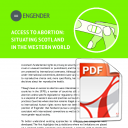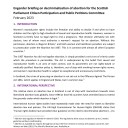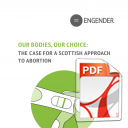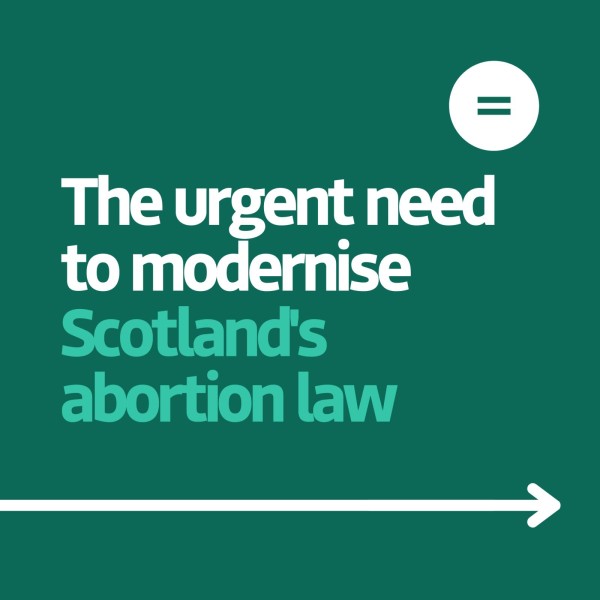Engender blog
Modernising Scotland's abortion law
Today we launch our new report, ‘Outdated, harmful and never in the public interest - The urgent need to modernise Scotland's abortion law and prevent prosecutions.’
Here’s why...
1. The law is in urgent need of modernisation.
The legal framework which currently governs when an abortion is permitted is made up of a patchwork of laws that stem from as far back as the 17th century. These measures largely reflect the eras in which they were introduced, and the degrees of patriarchal control women were subject to at the time. Put another way, one of these laws was first introduced at a time when witch trials were still happening.
The law is therefore out of step with the experiences of women in modern Scotland for whom abortion is routine healthcare, accessed by around one in three in their lifetimes.
The report is informed by input from legal experts and medical professionals, detailing the wide-ranging support that exists for decriminalisation. It concludes with clear recommendations for Scottish Government and other key decisionmakers on what the next steps towards a modernised regulatory framework should be. These actions will be vital to support ongoing improvement in reproductive healthcare services and the safeguarding of reproductive rights for future generations of Scotland’s women and pregnant people.
2. Prosecutions for crimes of abortion are happening in Scotland.
Under the current law women and pregnant people in Scotland have no legal right to end a pregnancy. That decision ultimately sits with doctors, two of whom must authorise the request for an abortion. This layers unnecessary complexity onto service delivery and creates delays and barriers for women. Without this permission and compliance with other rules set out in the Abortion Act 1967, abortion is illegal across Britain, and women, healthcare providers and people assisting someone to have an abortion can be subject to prosecution.
The sharp increase in prosecutions for abortion related offences in England throws into stark relief how the legal framework is increasingly working at odds with modern clinical realities, and public health, human rights and gender equality obligations.
Our report examines the shortcomings of the current legal framework in Scotland in detail, including evidence that women have been charged and prosecuted for abortion related offences in recent years.
3. The current system in Scotland is not keeping step with international human rights standards.
With a few high-profile exceptions, countries across the world are increasingly modernising and liberalising their legal frameworks on abortion. Laws in Scotland, England and Wales now trail behind more progressive regulatory frameworks in most other European countries. Britain, including Scotland, has also failed to keep pace with international human rights standards. These are clear that access to safe, legal and timely abortion is a fundamental human right that must not be regulated using criminal law and penalties.
4. Abortion is treated differently under the law without medical justification.
Despite being one of the most routinely used and safe forms of healthcare- accessed by one in three women in their lifetimes, abortion is treated differently in law than almost all other medical procedures. In all other fields of healthcare, medical bodies are able to shape guidance and regulation based on best practice, rather than complex laws, including criminal law, from a bygone era. Dealing with abortion in this way creates a harmful stigma around an essential health service. It also prevents the development of services that are based on the best available clinical standards. Like all other healthcare, the governance of abortion should rightfully sit with healthcare regulators and professional medical bodies, not criminal courts.
5. Support for abortion rights is widespread
Decriminalisation is supported by the World Health Organisation, all relevant medical bodies in the UK, UN treaty bodies, trades unions and equalities advocates. In January 2024, 93% of those polled in Scotland agree that women should have the right to an abortion.
In Summary
The current legal framework in Scotland is:
-
Outdated and falling behind international human rights standards
-
Out of step with guidelines from global and national health bodies
-
Impeding access to quality abortion care for women
-
Perpetuating abortion stigma, harmful gender stereotypes and women’s inequality
-
Preventing healthcare practitioners from providing the highest standards of care
-
Causing women trauma and lasting harm, that is most pronounced for marginalised women and those in situations of vulnerability
The report sets out how:
-
Women have been charged and prosecuted for crimes related to abortion in Scotland in the 21st century.
-
Abortion is vital, routine healthcare and is one of the safest and most frequently accessed medical procedures used by women and pregnant people across the world.
-
Decriminalisation of abortion is recommended by the World Health Organisation, major international human rights mechanisms, and all relevant professional medical bodies in the UK.
-
Decriminalisation is needed for realisation of a wide range of women’s human rights and for government compliance with international human rights law.
-
Safe and legal abortion is a cornerstone of progress towards women’s equality.
-
Decriminalisation is in line with high-level commitments from Scottish Government on gender equality and would help future-proof against regression on women’s rights.
-
Decriminalisation would remove unnecessary “chilling” pressures on healthcare professionals, who are exposed to potential criminal sanctions at work.
Read the full report here.
Share this post on …
Comments: 0 (Add)
Downloads
 Access to Abortion: Situating Scotland in the Western World
This paper describes the different legal and regulatory contexts for abortion healthcare in Scotland and in other European and western nations.
Access to Abortion: Situating Scotland in the Western World
This paper describes the different legal and regulatory contexts for abortion healthcare in Scotland and in other European and western nations.
 Engender briefing on decriminalisation of abortion for the Scottish Parliament Citizen Participation and Public Petitions Committee
This is a briefing for MSPs ahead of the Scottish Parliament Citizen Participation and Public Petitions Committee consideration of a new petition to amend the law to fully decriminalise abortion in Scotland on 22nd February 2023.
Engender briefing on decriminalisation of abortion for the Scottish Parliament Citizen Participation and Public Petitions Committee
This is a briefing for MSPs ahead of the Scottish Parliament Citizen Participation and Public Petitions Committee consideration of a new petition to amend the law to fully decriminalise abortion in Scotland on 22nd February 2023.
 Engender submission of evidence to the Scottish Parliament Health, Social Care and Sport Committee call for evidence on the Abortion Services (Safe Access Zones) (Scotland) Bill
Engender has worked on access to abortion care since 2016 and the devolution of this policy area to the Scottish Parliament.
Engender submission of evidence to the Scottish Parliament Health, Social Care and Sport Committee call for evidence on the Abortion Services (Safe Access Zones) (Scotland) Bill
Engender has worked on access to abortion care since 2016 and the devolution of this policy area to the Scottish Parliament.
 Our Bodies, Our Choice: The Case for a Scottish Approach to Abortion
The devolution of abortion law as part of the Scotland Act 2016 also provides Scotland with the opportunity to develop a Scottish approach to women’s reproductive rights, incorporating improved, modernised and standardised service provision underpinned by a progressive devolved legal framework.
Our Bodies, Our Choice: The Case for a Scottish Approach to Abortion
The devolution of abortion law as part of the Scotland Act 2016 also provides Scotland with the opportunity to develop a Scottish approach to women’s reproductive rights, incorporating improved, modernised and standardised service provision underpinned by a progressive devolved legal framework.

Newsletter
Sign up to receive our newsletter here:
Sign up to our mailing list
Receive key feminist updates direct to your inbox:
